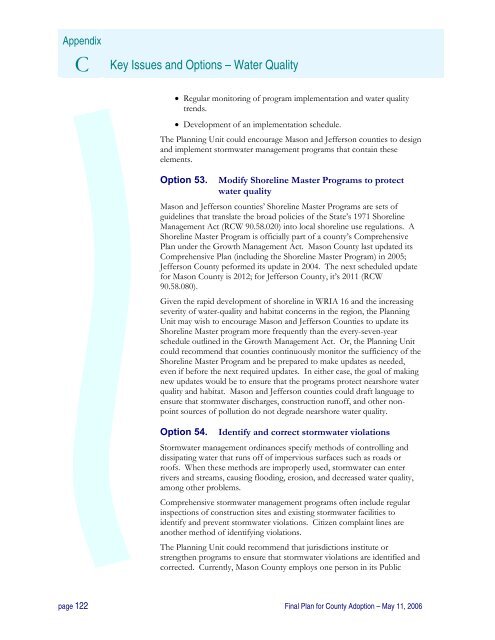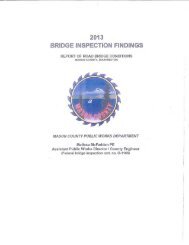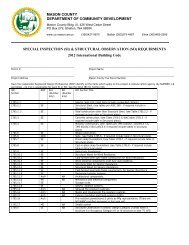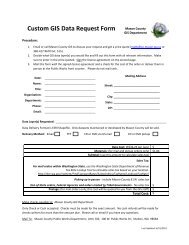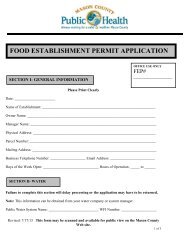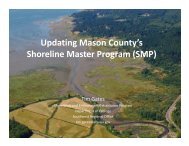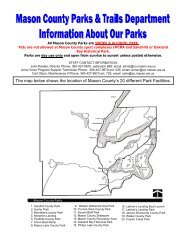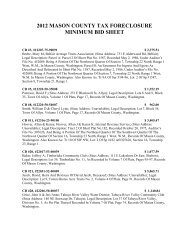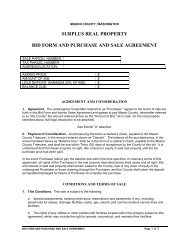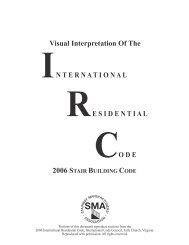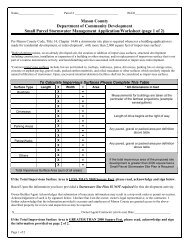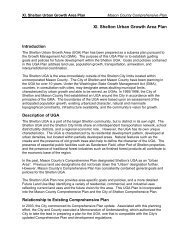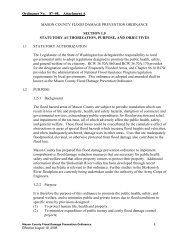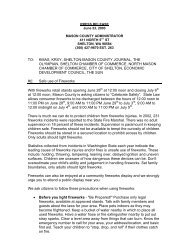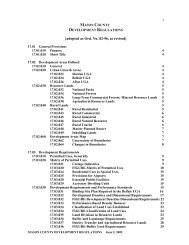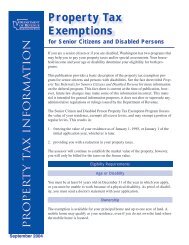Watershed Management Plan - Mason County
Watershed Management Plan - Mason County
Watershed Management Plan - Mason County
Create successful ePaper yourself
Turn your PDF publications into a flip-book with our unique Google optimized e-Paper software.
Appendix<br />
C Key Issues and Options – Water Quality<br />
• Regular monitoring of program implementation and water quality<br />
trends.<br />
• Development of an implementation schedule.<br />
The <strong>Plan</strong>ning Unit could encourage <strong>Mason</strong> and Jefferson counties to design<br />
and implement stormwater management programs that contain these<br />
elements.<br />
Option 53.<br />
Modify Shoreline Master Programs to protect<br />
water quality<br />
<strong>Mason</strong> and Jefferson counties’ Shoreline Master Programs are sets of<br />
guidelines that translate the broad policies of the State’s 1971 Shoreline<br />
<strong>Management</strong> Act (RCW 90.58.020) into local shoreline use regulations. A<br />
Shoreline Master Program is officially part of a county’s Comprehensive<br />
<strong>Plan</strong> under the Growth <strong>Management</strong> Act. <strong>Mason</strong> <strong>County</strong> last updated its<br />
Comprehensive <strong>Plan</strong> (including the Shoreline Master Program) in 2005;<br />
Jefferson <strong>County</strong> peformed its update in 2004. The next scheduled update<br />
for <strong>Mason</strong> <strong>County</strong> is 2012; for Jefferson <strong>County</strong>, it’s 2011 (RCW<br />
90.58.080).<br />
Given the rapid development of shoreline in WRIA 16 and the increasing<br />
severity of water-quality and habitat concerns in the region, the <strong>Plan</strong>ning<br />
Unit may wish to encourage <strong>Mason</strong> and Jefferson Counties to update its<br />
Shoreline Master program more frequently than the every-seven-year<br />
schedule outlined in the Growth <strong>Management</strong> Act. Or, the <strong>Plan</strong>ning Unit<br />
could recommend that counties continuously monitor the sufficiency of the<br />
Shoreline Master Program and be prepared to make updates as needed,<br />
even if before the next required updates. In either case, the goal of making<br />
new updates would be to ensure that the programs protect nearshore water<br />
quality and habitat. <strong>Mason</strong> and Jefferson counties could draft language to<br />
ensure that stormwater discharges, construction runoff, and other nonpoint<br />
sources of pollution do not degrade nearshore water quality.<br />
Option 54.<br />
Identify and correct stormwater violations<br />
Stormwater management ordinances specify methods of controlling and<br />
dissipating water that runs off of impervious surfaces such as roads or<br />
roofs. When these methods are improperly used, stormwater can enter<br />
rivers and streams, causing flooding, erosion, and decreased water quality,<br />
among other problems.<br />
Comprehensive stormwater management programs often include regular<br />
inspections of construction sites and existing stormwater facilities to<br />
identify and prevent stormwater violations. Citizen complaint lines are<br />
another method of identifying violations.<br />
The <strong>Plan</strong>ning Unit could recommend that jurisdictions institute or<br />
strengthen programs to ensure that stormwater violations are identified and<br />
corrected. Currently, <strong>Mason</strong> <strong>County</strong> employs one person in its Public<br />
page 122 Final <strong>Plan</strong> for <strong>County</strong> Adoption – May 11, 2006


